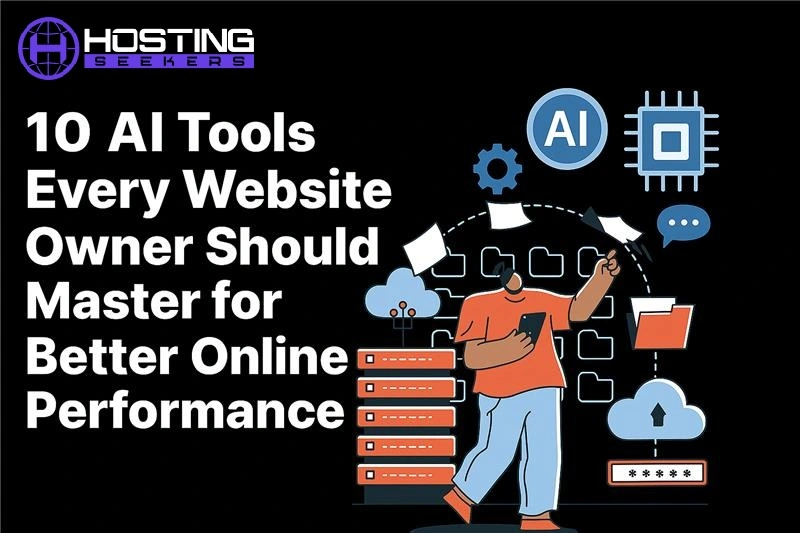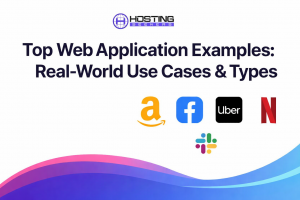
10 AI Tools Every Website Owner Should Master for Better Online Performance
IT Updated on : January 5, 2026Every website owner dreams of achieving smoother workflows, better content, and stronger performance, right? However, for many, it’s nothing other than a constant struggle. Honestly, if you are a website owner and think that you can manage everything from writing and design to SEO and management alone, then trust me, you will only end up wasting your time and efforts.
But the point here is, since it’s the era of AI and automation, why do you even need to do things manually? Trust me, if you want to stay steadfast in the digital market, keep up with the evolving trends, and actually earn better results, you have to look for the right tools. Remember, success isn’t in doing more; it can only be achieved by working smarter and adapting to new technologies.
That’s why the right mix of writing assistants, design platforms, SEO optimizers, and automation tools is the only formula that can help you run your website efficiently and keep it growing.
10 Smart AI Tools To Improve Website Performance
Here are the 10 most useful and professional tools that you should start using if you want to improve the performance of your website and ensure it actually drives better results.
1. Jasper AI
Jasper is an AI content platform that is especially designed for users who want to effectively manage their content creation process. The best thing about this tool is that it can easily generate any form of content, including long-form blogs, ad copy, or even product descriptions within seconds.
The tool features advanced context-aware models to ensure the content always aligns with the brand voice. Thus, as a team, you can surely use the tool to scale consistent messaging across channels while keeping brand voice and style intact.
Key features
- Long-form editor with context memory and content briefs.
- Workflow automation for recurring marketing tasks.
- Collaboration tools and version control for teams.
- Export and CMS integrations.
Pros
- Speeds marketing production at scale.
- Keeps brand tone consistent across pieces.
- Good for teams with repeatable content needs.
Cons
- Can produce generic phrasing without tight prompts.
- Higher cost for full team features.
- Requires human editing for final accuracy and nuance.
Price
- Pro Plan: $69/month or $59/month billed annually
- Business Plan: Custom pricing tailored for companies
What is it Best for?
The tool is indeed an ideal choice when you want to scale up your marketing content production while preserving brand voice.
2. ChatGPT (OpenAI)
ChatGPT is one of the most reliable and globally trusted online AI chatbots that you can surely count on as your all-in-one assistant.
Honestly, it’s more than just a writing tool. You can use its AI to answer questions, draft content, and brainstorm ideas. It also helps you code and plan projects, making it a complete assistant for both creative and technical tasks.
Though it is not a good option for fact-heavy content generation, it can surely be a reliable partner for creating drafts, performing repetitive tasks, or refining final outputs.
Key features
- Natural conversational interface for iterative editing.
- File uploads, image generation, and multimodal responses.
- API access for automations and integrations.
Pros
- Extremely flexible for many tasks.
- Fast ideation and reprovisioning of text.
- Wide plugin and API ecosystem.
Cons
- Can hallucinate facts—always verify.
- Output quality depends on prompt design.
- Sensitive data needs careful handling.
Price
- Free version with limited features
- ChatGPT Plus: $20/month for enhanced access and capabilities
What is it Best for?
Honestly, ChatGPT works best in rapid ideation, drafting, and improving the flow of your content. It indeed helps you save a lot of time, manage workflows, and maintain consistent content quality.
3. Canva
Canva is an all-in-one design and content platform that almost all website owners use to create visuals, simple videos, and documents. The tool includes bundles of templates, stock assets, brand kits, and AI features (text-to-image, magic edit) that you can surely rely on to design faster and smarter.
Not only this, but you can also take help from the tool to assemble social posts, thumbnails, PDFs, and short videos, even with zero design skills. Trust me, using Canva, you will surely not have to hire a designer for consistent, regular templates and brand controls.
Key features
- Template library for web banners, social, and ads.
- Brand Kit: fonts, colors, logos, templates.
- Built-in stock photos, icons, and short video editing.
- AI tools for image generation and copy suggestions.
- Easy export to multiple file types and sizes.
Pros
- Fast visual production with a low learning curve.
- Keeps visual brand elements centralized.
- Good for non-designers to produce polished assets.
Cons
- Complex layouts still need a designer’s eye.
- Overused templates can feel generic.
- Pro assets require a subscription.
Price
- Free Plan available
- Pro Plan: $12.99/month or $119.99/year
- Teams Plan: $14.99/month or $149.90/year
What is it Best for?
The tool indeed works best for creating on-brand visuals and quick marketing assets for websites and social media.
4. FeedHive
FeedHive is an AI-driven social content planner and scheduler that is especially designed for website owners to help them effectively repurpose their content and systematically post it. The best thing about this tool is that it helps you generate post ideas, test variations, schedule cross-platform posts, and recycle high-performing content using smart recycling rules.
Not only this, but FeedHive also features a visual calendar and preview tools to effectively show you how each post will look and perform on social media. Thus, you can surely rely on the tool to turn all your long blog content into sequenced micro-posts and quickly test their tone or format variations.
Key features
- AI post generator and templates for different platforms.
- Visual calendar with drag-and-drop scheduling.
- Content recycling and conditional posting rules.
- Platform previews and cross-posting adjustments.
- Analytics to spot high-performers for reuse.
Pros
- Saves time turning long content into many posts.
- Makes systematic A/B testing of post formats easy.
- Strong recycling to extend content life.
Cons
- Analytics depth lags specialist analytics tools.
- Platform limits may require manual tweaks for complex posts.
- Learning curve for advanced automation rules.
Price
- Creator: $19/month
- Brand: $29/month
- Business: $99/month
- Agency: $299/month
What is it Best for?
The tool indeed works best for repurposing website content into consistent, testable social sequences—all within a few clicks
5. WriterZen
WriterZen is especially designed for SEO specialists to help them effectively streamline their workflow. You can surely rely on the tool to handle all your SEO tasks—from thorough keyword research to optimized content creation—in one workspace.
You can use the tool to cluster keywords, analyze topic gaps, and get AI’s assistance on SEO-friendly content generation. Not only this, but you can also utilize the tool to conveniently build content briefs, draft on the platform, and validate on-page signals. Thus, it indeed ensures that your content always matches search intent and the latest SEO standards.
Key features
- Keyword clustering and intent analysis.
- Topic discovery and content brief generator.
- AI content assistant integrated with SEO metrics.
- Content planner and writer collaboration tools.
- SERP analysis and gap detection.
Pros
- Cuts research time by grouping keywords logically.
- Keeps SEO intent central to writing.
- Lightweight and focused workflow for content teams.
Cons
- Not as feature-rich as full marketing suites.
- AI drafting needs human SEO judgment.
- Advanced link or PPC tools are limited.
Price
- $150/ all in one basic (all in one payment)
What is it Best for?
WriterZen indeed works best when you want to produce SEO-driven content briefs and drafts that match search intent.
6. Paraphrase-Online — Paraphrasing Tool
Paraphrase-Online is a free paraphrasing tool designed to help content creators effectively improve the flow, clarity, and readability of their content without wasting any extra time on manual rephrasing.
The best thing about this tool is that it helps users cut out clutter and repetition from their content without changing the core meaning. Thus, you can rely on it to generate alternative phrasings, tighten sentences, and test tone variants for on-page content. It can really help you repurpose old content and remove any fluff from new articles.
Key features
- Instant paraphrase for pasted text or file uploads.
- Modes for creativity vs. closeness to the original.
- Export/download support for common formats.
Pros
- Fast and simple for rephrasing.
- Useful for repurposing and tone adjustments.
- No installation required.
Cons
- The free version allows you to paraphrase only 1000 words in one go.
Price
- Weekly Plan: $3/week
- Monthly Plan: $5/month
- Yearly Plan: $36/year
What is it Best for?
The tool indeed works the best for quickly producing alternative phrasings and repurposed snippets for site copy.
7. Divi AI (Elegant Themes)
Divi AI is basically a built-in AI assistant for WordPress. The tool is designed to efficiently integrate generative tools into the Divi visual WordPress builder. Thus, whenever you generate any page sections, on-brand copy, images, or code snippets, you can instantly drop them into Divi’s editor for quick refinement.
The best thing about this tool is that Divi AI supports ready-to-edit sections, which you can easily customize according to your style. So, whenever you need rapid prototype pages or consistent hero sections across landing pages, you can just turn to the tool and create them in seconds.
Key features
- Page and section generation from short prompts.
- On-brand copy and image generation inside the builder.
- Presets and AI styles are saved per project.
- Direct insertion into the Divi visual editor for instant editing.
Pros
- Fast proofing and page prototyping.
- Reduces boilerplate work for landing pages.
- Keeps design and content editable in one place.
Cons
- Generated layouts can require visual tuning.
- Heavily WordPress/Divi-dependent.
- Can encourage overreliance on defaults.
Price
- Monthly Subscription: $16.08/month
- Yearly Subscription: $288/year
What is it Best for?
As mentioned, the tool is best known for its rapid prototyping and seamless integration with WordPress pages inside Divi’s visual editor.
8. Asana
Asana is a work and project management tool that you should definitely add to your everyday toolkit if you want to keep a clear track of your tasks, projects, and goals.
It offers lists, boards, timelines, workload views, and automation rules. Thus, the tool indeed helps teams connect website projects (content calendars, releases, audits) to company objectives to ensure you always get organized and measurable results.
The best part?
It even comes with advanced AI assistants that can effectively turn your long discussions into work summaries, suggest the next steps, and automate routine task creation for recurring site maintenance.
Key features
- Multiple project views: list, board, timeline, calendar.
- Custom fields, rules, and automated workflows.
- Workload and resource planning dashboards.
- Integrations with Git, CMSs, and design tools.
- AI helpers for summaries and task generation.
Pros
- Keeps complex site projects organized.
- Makes handoffs and deadlines explicit.
- Good visibility into team workload.
Cons
- Set up takes time for consistent governance.
- Overhead if you track too many micro-tasks.
- Some useful integrations behind paid tiers.
Price
- Personal (free) up to 10 users
- Starter Plan: $10.99 per user/month
What is it Best For?
As a website owner, you can surely rely on the tool to effectively manage your workload, helping you coordinate content calendars, site launches, and cross-team workflows.
9. Zapier
Zapier is also a management tool that helps website owners effectively automate all their repetitive tasks by connecting apps into workflows called “Zaps.” Therefore, you can surely use the tool to trigger emails, create CMS drafts, move data, and call AI steps without code.
What’s more?
Zapier also helps you glue all your website stacks together.
Let me explain how.
The tool basically connects form submissions to CRMs, automates content publication, and syncs analytics. Thus, you can surely count on it to remove manual copy-paste tasks and ensure consistent data flow between systems.
Key features
- Connects thousands of apps with no code.
- Conditional logic, scheduled triggers, and data transforms.
- Built-in functions (formatting, code steps, AI steps).
- Interface builder and automation logs.
Pros
- Saves hours of repetitive admin work.
- Fast to set up basic automations.
- Scales from simple to complex workflows.
Cons
- Sensitive data can be exposed if not configured carefully.
- Complex flows may need testing and maintenance.
- Pricing scales with task volume.
Price
- $19.99/month for the basic paid tier
- $69/month for teams
What is it Best for?
The tool indeed works best for automating cross-platform site tasks and effectively managing routine data flows.
10. Semrush
Semrush is more like a full digital marketing platform that you can surely rely on to manage the SEO, content, and competitive research of your website.
Not only this, but the tool also helps you effectively perform a thorough keyword research, site audits, backlink analysis, rank tracking, content optimization, and AI-powered content tools—in short, it includes all the features you need to improve ranking and secure a top position on SERPs. So, use it to pick content opportunities, measure organic impact, and monitor competitors’ moves.
Key features
- Keyword research, clustering, and intent metrics.
- Site audit and technical SEO checks.
- Backlink analytics and competitor research.
- Content optimization toolkit and AI Copilot.
- Rank tracking and custom reporting.
Pros
- Deep competitive insight and large data sets.
- Centralized SEO and content workflow.
- Strong reporting for client or stakeholder updates.
Cons
- It can be expensive for small sites.
- Tool depth creates a learning curve.
Price
- Pro plan: $139.95/month
What is it Best for?
Semrush is surely the best tool option for website owners who want to formulate a data-driven SEO strategy, discover content opportunities, and monitor competitors just within a few clicks.
Comparison Table
All the tools discussed in this article are indeed top choices for website owners to effectively manage their workload and streamline workflows. So, to help you choose the best tool for your website management, here is a side-by-side comparison of all the tools. Keep scrolling to learn how each one plays a role in improving your site’s performance.
| Tool | Main Function | Key Strength | Practical Use for Website Owners | Integration Level | Limitations |
| Jasper AI | Creates AI-based content | Keeps your brand tone consistent | Writes blogs, product pages, and ads quickly | High | Needs good prompts and proofreading |
| ChatGPT | AI writing assistant | Helps with ideas, research, and writing | Creates outlines, FAQs, and first drafts | High | Can include factual mistakes if unchecked |
| Canva | Visual design platform | Makes design simple for everyone | Creates banners, ads, and social media posts | Medium | Templates can look similar |
| FeedHive | AI content scheduler | Reuses and improves old content | Turns blogs into social posts for different platforms | Medium | Analytics are limited |
| WriterZen | SEO and keyword planner | Group keywords by intent for better focus | Helps build topic clusters and SEO briefs | High | Needs manual SEO adjustments |
| Paraphrase-Online | Paraphrasing tool | Rephrases content for clarity and originality | Improves site copy and meta descriptions | Low | It can sound robotic if used too much |
| Divi AI | AI for WordPress building | Creates sections, text, and visuals fast | Helps build and update WordPress pages | High | Only for Divi users |
| Asana | Task and project manager | Keeps projects and teams organized | Tracks content plans, tasks, and deadlines | High | Complex setup takes time |
| Zapier | Automation tool | Connects and automates different apps | Automates CMS updates, emails, and forms | Very high | Needs testing for complex workflows |
| Semrush | SEO and marketing suite | Offers deep keyword and competitor insights | Audits SEO and tracks site performance | High | Expensive for small teams |
Final Words
Trust me, once you find the right tools for your website management, you’ll start seeing thriving results even without a large team. But remember, relying on tools doesn’t mean you should hand everything over to AI and step aside.
Absolutely not.
Honestly, doing so will only limit the few organic results you might be getting otherwise. The smarter way is to use these tools as assistants, know when they can save you time and effort, and when your creativity should take the lead. Once you strike that balance, these tools evolve from simple helpers into true growth partners.
Frequently Asked Questions (FAQs)
Q 1. What are the best AI tools to improve website content creation and design?
Ans. If you need a tool to introduce a creative edge in your writing and streamline workflow, then Jasper AI and ChatGPT are surely the go-to options for you. However, if you are concerned about designing, then you should give Canva AI a chance.
Q 2. How can AI tools help optimize website SEO and increase online visibility?
Ans. WriterZen and Semrush both work best to help you effectively improve your SEO strategy. You can take help from WriterZen to find the right keywords and plan strong topics that boost your content visibility.
Semrush, on the other hand, can really help you track how your site performs and what your competitors are doing.
Therefore, combining both can help your website rank higher and reach more visitors.
Q 3. Which AI tools can automate website project management and workflow efficiency?
Ans. If you are concerned about content management, then Asana can surely be a reliable partner, helping you organize your projects and tasks so nothing gets missed.
Q 4. How do AI tools like Jasper AI, ChatGPT, and Semrush compare in boosting website performance?
Ans. Jasper AI creates quality content that fits your brand, while ChatGPT helps you brainstorm ideas and write quickly. Lastly, Semrush focuses on SEO data to improve visibility.
Though each of these tools plays a very different role, they are surely essential for website owners to help them build a strong and high-performing website.
Q 5. What are the key benefits of using AI-powered automation tools like Zapier and Asana for website owners?
Ans. Zapier and Asana cut down repetitive work and connect your favorite tools. Therefore, you can surely rely on them to stay organized and focus more on growth and strategy instead of manual tasks.
These tools make running a website easier and faster.




